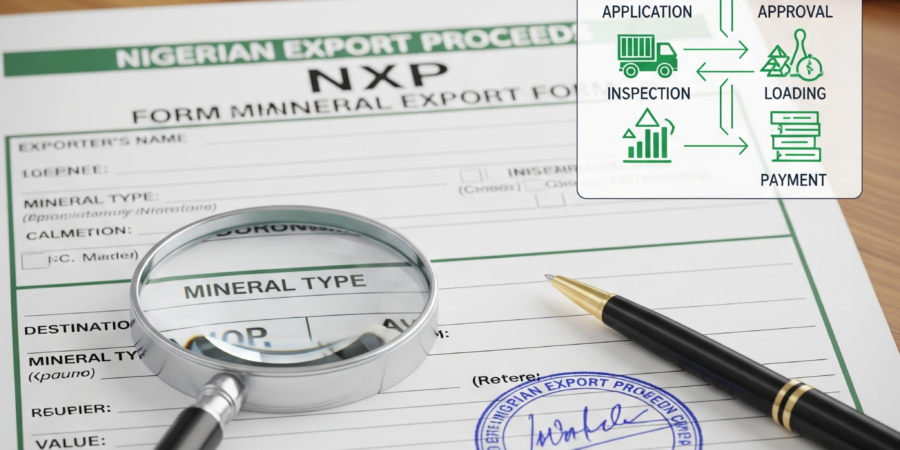For a mineral exporter in Nigeria, a single document stands between a successful international transaction and a seized shipment: the NXP Form. More than just a piece of paperwork, the Nigerian Export Proceeds (NXP) Form is the Central Bank of Nigeria’s (CBN) tool for monitoring every non-oil export.
This guide is your definitive handbook for flawlessly navigating the NXP process. We will demystify its purpose, outline the electronic steps, and provide a clear checklist of the documents you need to ensure your mineral exports are fully compliant and trouble-free.
1. What is the NXP Form and Why Is It So Important?
The NXP Form is a mandatory document that serves two critical functions:
- Government Regulation: It is a legal declaration by the exporter to the CBN that a specific export transaction is taking place. This allows the government to track and monitor the volume and value of all non-oil exports.
- Foreign Exchange Repatriation: Its primary purpose is to ensure that the foreign exchange earned from the export of goods is repatriated back into Nigeria, which is a key government policy to boost the country’s foreign reserves. Without a valid NXP Form, your export proceeds cannot be legally brought back into the country.
2. The Step-by-Step E-NXP Process
The entire NXP process is now electronic (e-NXP), making it more efficient but also less forgiving of mistakes. Here is the streamlined, 5-step process:
- Step 1: Exporter Registration: Your company must first be registered on the Trade Portal.
- Step 2: Initiate the NXP Form: The exporter, or a designated agent, initiates the electronic NXP form on the portal. This is where you will provide the core details of your export transaction.
- Step 3: Submit to Your Bank: The initiated form is then electronically submitted to your commercial bank. Your bank acts as the vital intermediary, and it is its responsibility to vet the application and all supporting documents.
- Step 4: Bank Review & Approval: Your bank will review the details and supporting documents you’ve submitted. This includes verifying the proforma invoice, the sales contract, and your export license. Once they are satisfied, they will approve and process the form.
- Step 5: NEPC Approval: After the bank’s approval, the form is forwarded electronically to the Nigerian Export Promotion Council (NEPC) for final approval. Once approved, the NXP Form number is sent to the Nigerian Customs Service (NCS), and your shipment is ready for clearance.
3. A Checklist of Documents for Your NXP Form
To avoid delays, ensure you have these documents ready before you begin the process. Your bank will require them for verification.
- Certificate of Incorporation (CAC): Your business must be a legally registered company.
- Exporter’s Certificate (NEPC): The mandatory certificate that proves you are a legal exporter.
- Mineral Export Permit (MSMD): This is your permit to export minerals for a specific transaction.
- Proforma Invoice or Sales Contract: A document showing the details of the goods, quantity, and value, signed by both the buyer and the seller.
- Clean Certificate of Inspection (CCI): The document that certifies the quality and quantity of your minerals.
Failure to correctly process the NXP form is considered illegal export. Your goods will be seized by Customs, and you will face severe penalties.
Navigating this technical process can be complex, and a single error can be very costly. Our service, Mining & Mineral Trading Company Setup (Nigeria), offers a seamless, done-for-you solution. We handle the entire legal setup, including the company registration and initial documentation for your export-ready business, ensuring you are prepared to navigate the export process flawlessly.
For a deeper dive into the legal requirements that precede this process, our ebook Nigerian Mining Industry: Environmental and Regulatory Compliance is your essential guide.
Once your business is legally established, the Nigerian Mineral Exchange provides a platform for you to sell your legally-sourced minerals to a global audience, turning your compliance into a competitive advantage.
📘 The Nigeria Mineral Trading & Licensing Blueprint (2026 Edition)
If you are serious about buying, selling, or trading minerals legally in Nigeria, you cannot afford to rely on guesswork, outdated advice, or hearsay. The regulatory environment is tightening fast, and costly mistakes now lead to permit denials, seizures, or permanent blacklisting.
That’s why we created The Nigeria Mineral Trading & Licensing Blueprint: 2026 Guide to Buying Center Licenses & Purchase Permits — an updated, clear, step-by-step, insider guide that shows you exactly how to obtain Mineral Buying Center Certificates, Purchase & Possession Permits, and related approvals without delays or regulatory traps.
This guide distills real regulatory procedures for 2026, compliance requirements, and practical insights used by serious operators — saving you months of confusion, wasted money, and avoidable risk.
If mineral trading is part of your business future, this blueprint is not optional — it’s protection.
READ ALSO:





Leave a Reply